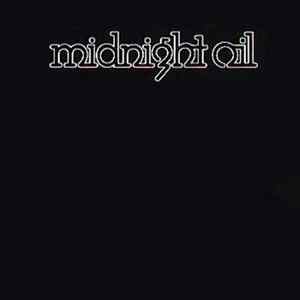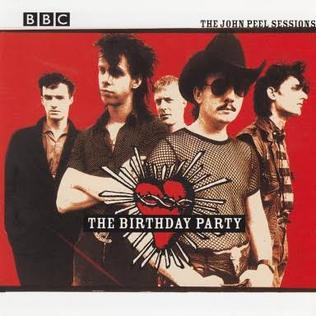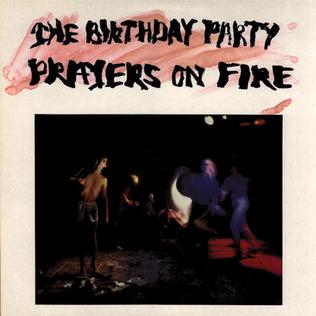
Midnight Oil is the debut album by Australian rock band Midnight Oil which was recorded in 1977 and released in November 1978 on the band's independent Powderworks label. It reached the top 50 on the Australian Kent Music Report Albums Chart. The album was later distributed by CBS Records and issued as a CD. The LP has a blue cover, however, the CD has a black cover. Because of the blue cover, the former version is often referred to, by fans, as the "blue album" or "the Blue Meanie". The lead single, "Run by Night", became the band's first minor hit in Australia and appeared on the Kent Music Report Singles Chart Top 100. It also had a video clip.

Head Injuries is the second studio album by Australian rock band Midnight Oil, released in October 1979 on their own Powderworks label and distributed by Columbia Records. The album was produced by Leszek J. Karski, recorded at 'Trafalgar Studios' in Sydney. It was the last Midnight Oil album to feature founding bass guitarist Andrew James, who quit the band due to illness. It peaked at No. 36 on the Australian Kent Music Report and by mid-1980 had achieved gold status in Australia.

The Birthday Party were an Australian post-punk band, active from 1977 to 1983. The group's "bleak and noisy soundscapes," which drew irreverently on blues, free jazz, and rockabilly, provided the setting for vocalist Nick Cave's disturbing tales of violence and perversion. Their 1981 single "Release the Bats" was particularly influential on the emerging gothic scene. Despite limited commercial success, The Birthday Party's influence has been far-reaching, and they have been called "one of the darkest and most challenging post-punk groups to emerge in the early '80s."
Whirlywirld were an Australian post-punk band led by Ollie Olsen in the late 1970s and early 1980s, and the first of his musical collaborations with drummer John Murphy. They played in Melbourne and Sydney and were supporters of the Melbourne little band scene.

The Little Band scene was an experimental post-punk scene which flourished in Melbourne, Victoria, Australia from late 1978 until early 1981. Instigated by groups Primitive Calculators and Whirlywhirld, this scene was concentrated in the inner suburbs of Fitzroy and St Kilda, and involved large numbers of short-lived bands, more concerned with artistic expression than commercial success. Frequently changing names, swapping members and sharing equipment, the bands played in small inner-city venues, often pubs, and their music was recorded live and broadcast by radio announcer Alan Bamford on community station 3RRR. In the scene, the distinctions between performers and audience were blurred; many audience members were either in little bands or ended up forming such.

Movement is the debut studio album by English rock group New Order, released on 13 November 1981 by Factory Records. Recorded in the wake of Joy Division frontman Ian Curtis' suicide the previous year, the album is a continuation of the dark post-punk sound of Joy Division's material, increasing the use of synthesizers while still being predominantly rooted in rock. At the time of its release, the album was not particularly well received by critics or audiences, only peaking at number thirty on the UK Albums Chart; the band would gradually shift to a more electronic sound over the course of the next year.
Essendon Airport is an Australian electronic music, post-punk group formed in 1978 which explored experimental minimalist and funk music. Founding mainstays were the duo of David Chesworth on electric piano and drum machine and Robert Goodge on guitar. They were joined in late 1980 by Ian Cox on saxophone and Paul Fletcher on drums.

Prayers on Fire is the debut studio album by Australian rock group the Birthday Party, released on 6 April 1981 on the Missing Link label in Australia, later licensed to the 4AD label. This was the band's first full-length release on an international record label and the first after changing the group's name from the Boys Next Door to the Birthday Party. It was recorded at Armstrong's Audio Visual Studios in Melbourne and Richmond Recorders in the nearby suburb of Richmond, between December 1980 and January 1981.
Fashion was a British new wave band, primarily active from 1978 to 1984, with a brief revival in 2009. They began as a post-punk band, before developing into a new wave/synth-pop ensemble that placed three singles on the lower reaches of the UK chart in 1982–84.

The Zorros were an Australian rock band, formed in 1979, comprising Nic Chancellor on lead vocals, Darren Smith on lead guitar, Alex Zammit on bass guitar and Greg Pedley on drums.
Laughing Clowns, sometimes written as The Laughing Clowns, were a post-punk band formed in Sydney in 1979. In five years, the band released three LPs, three EPs, and various singles and compilations. Laughing Clowns' sound is free jazz, bluegrass and krautrock influenced. The band formed to accommodate Ed Kuepper's growing interest in expanding brass-driven elements he had brought to The Saints' third album, Prehistoric Sounds, and by adopting flattened fifth notes in a rock and roll setting while using a modern jazz styled band line-up.
Ash Wednesday is an Australian musician, who played in JAB, Models and Einstürzende Neubauten.
→ ↑ → was an Australian music, art and performance group, best known for their experimental music. They formed in Melbourne in 1977 and were led by Philip Brophy. The group performed music, produced artwork, films, videos, live theatre, multi-media, and wrote literature.
Australian musicians played and recorded some of the earliest punk rock, led by The Saints who released their first single in 1976. Subgenres or offshoots of punk music, such as local hardcore acts, still have a strong cult following throughout Australia.
Voigt/465 were an Australian post-punk band based in Sydney, Australia. They were a feature of the Sydney inner-city music-scene during the late 1970s and their music was critically acclaimed. Their sound was influenced by Krautrock and has been described by a band-member as an "unsettling mixture of song-driven rock elements and free-noise experimentation". Voigt/465 recorded an album, Slights Unspoken, before they disbanded in late 1979. With their self-funded recordings and determinedly uncompromising music Voigt/465 epitomised the do-it-yourself ethic of the alternative music scene of the late 1970s.

The Crystal Ballroom was a music venue that opened in 1978 in St Kilda, an inner suburb of Melbourne, Victoria, Australia. Located within the George Hotel at 125 Fitzroy Street, it has often been referred to as the epicentre of Melbourne's post-punk scene, launching the careers of The Birthday Party, Dead Can Dance and many other local groups, as well as showcasing international acts, including The Cure, New Order and The Fall.

Tablewaiters were an Australian Post-punk band active from 1980 to 1986. They were founded by Tony Ameneiro on synthesiser and Graeme Synold on lead vocals; by 1981 they included Gye Bennetts on drums, Ian Robertson on bass guitar, and Ed Lee on lead guitar. By 1984 they were joined by Phillip Hyrwka who replaced Bennetts on drums. After Tablewaiters' disbandment Ameneiro pursued a career in visual arts. Tablewaiters had undertaken various national tours and supported both national and international artists: Simple Minds, The Psychedelic Furs, Split Enz, INXS, Midnight Oil, Machinations, Laughing Clowns, Models, Hunters & Collectors, Eurogliders, and The Birthday Party.

Music for Stowaways is the debut album by English electronic act British Electric Foundation (B.E.F.), formed by musicians Martyn Ware and Ian Craig Marsh. The album released in the United Kingdom as a limited edition cassette in March 1981 by Virgin Records, who also released an LP version of the album titled Music for Listening To later in the year with a different track list and cover art, aiming its release for export markets. The Stowaways version was originally released concurrently with Ware and Marsh's first single with Heaven 17, "(We Don't Need This) Fascist Groove Thang", itself a developed version of the Music for Stowaways track "Groove Thang".
Nun is a Melbourne-based synth punk band formed in 2011. They have released two albums.
Young Charlatans were a briefly existing Australian punk rock band comprising Janine Hall on bass guitar, Jeffrey Wegener on drums, Ollie Olsen on vocals and guitar and Rowland S. Howard on guitar. They formed in 1977 and disbanded in the following year.









